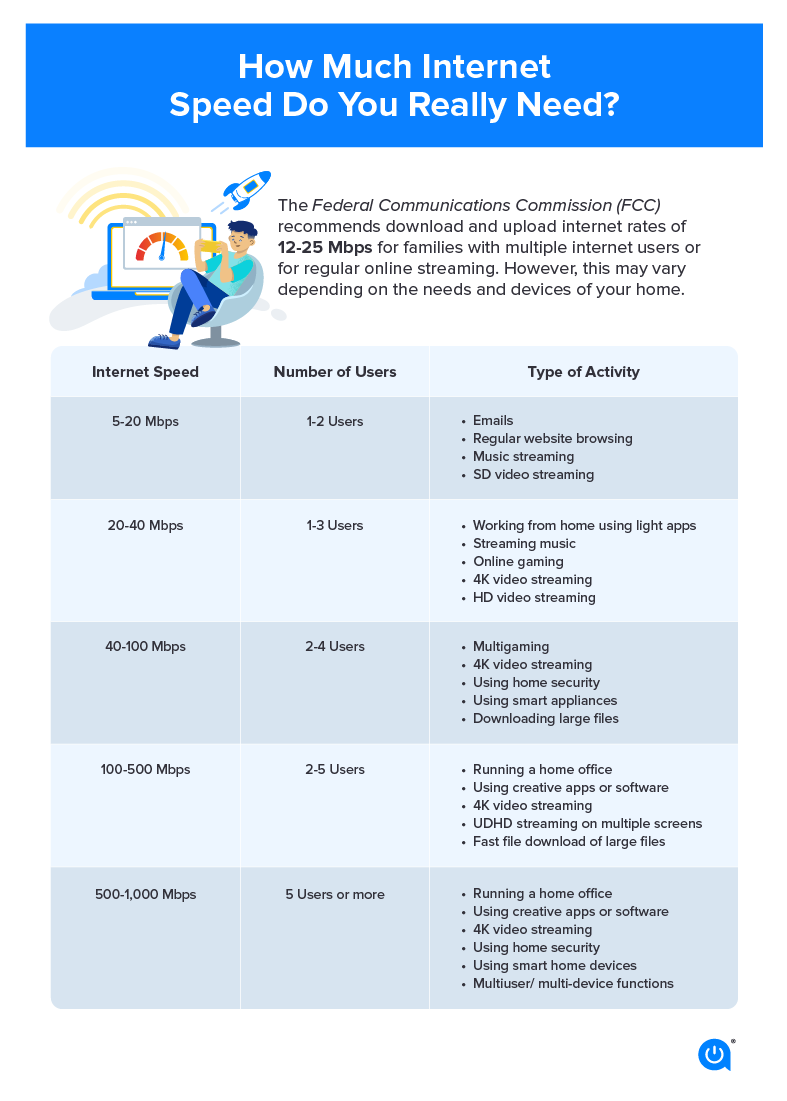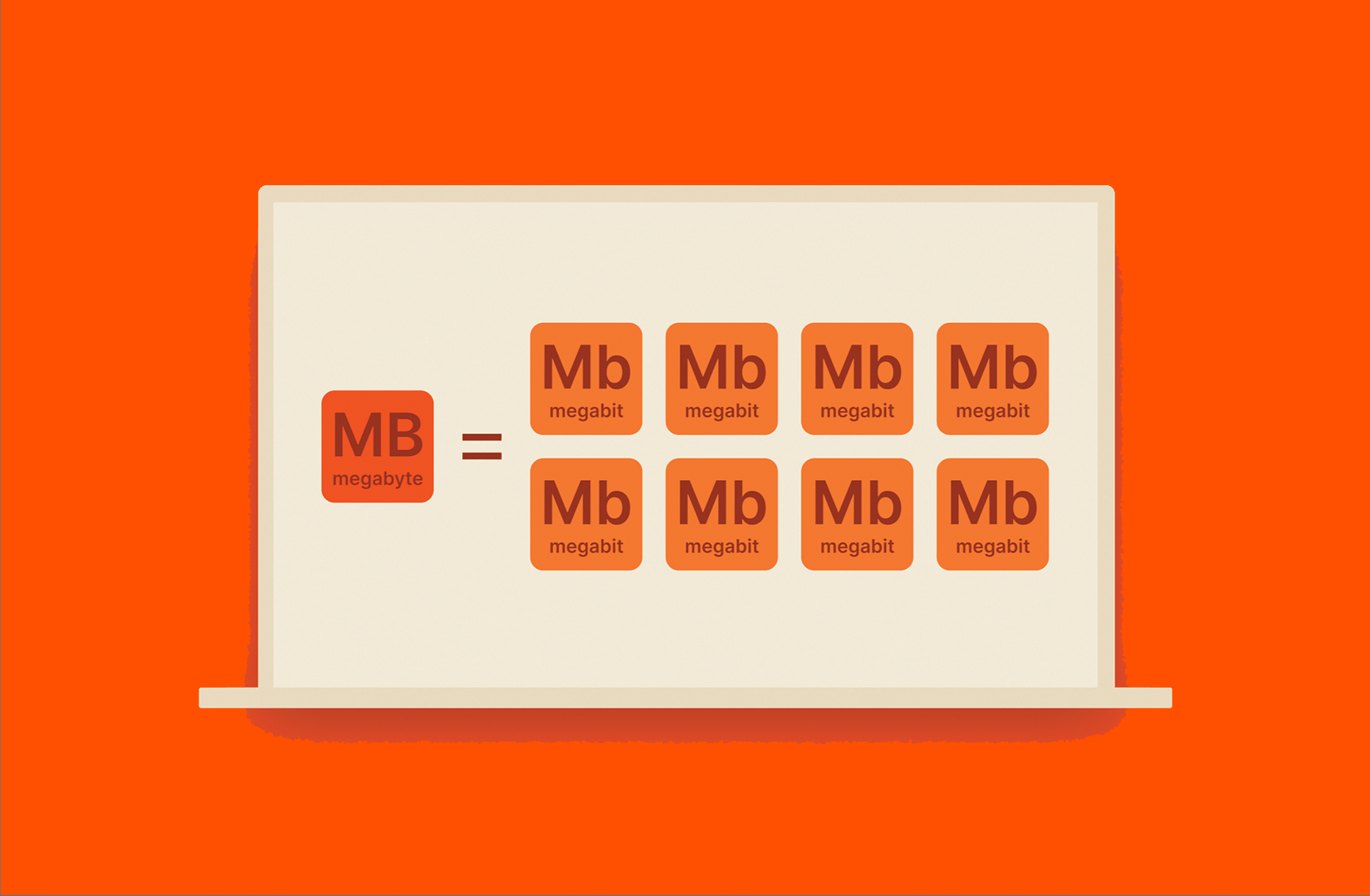A Comprehensive Guide to Measuring Megabits Per Second for Home Use
A Comprehensive Guide to Measuring Megabits Per Second for Home Use
Blog Article
Just How Megabits Per Second Effect Your Online Activities
The concept of megabits per second (Mbps) plays a pivotal function in shaping our online experiences. As electronic activities proliferate, comprehending the implications of Mbps on pc gaming, video, and streaming conferencing becomes increasingly essential. Higher Mbps can improve performance and minimize interruptions, while inadequate speeds might promote frustration and ineffectiveness. Assessing your home's details needs in relation to these speeds is essential, especially as several devices try transmission capacity. Yet, the subtleties of how Mbps impacts different online tasks necessitate more exploration, especially as our reliance on electronic connection continues to develop.
Understanding Megabits Per Second
When thinking about internet rate, it's vital to understand the principle of megabits per second (Mbps), which functions as a common measurement for information transfer prices. This statistics evaluates just how much information can be sent over a web link in one second, providing a clear understanding of efficiency capacities - Megabits Per Second. For context, one megabit is equal to one million little bits, and Mbps is frequently used to reveal data transfer for numerous on the internet tasks
A greater Mbps shows a faster internet link, enabling individuals to execute tasks such as downloading files, browsing web sites, and taking part in on-line gaming a lot more effectively. For example, regular browsing calls for around 1-5 Mbps, while streaming high-def video might require 5-25 Mbps. Recognizing these needs is essential for identifying the suitable internet rate required for certain tasks.
In addition, the variety of tools attached to a network can impact overall efficiency. Numerous users streaming, video gaming, or downloading simultaneously can stress readily available data transfer, leading to slower rates - Megabits Per Second. Reviewing personal online habits and demands is crucial in selecting a web plan that straightens with one's requirements, making certain a smooth electronic experience
Streaming and Buffering Issues
Streaming high-definition material has actually come to be a staple of modern online amusement, yet it is typically accompanied by irritating buffering problems. These disruptions can dramatically diminish the viewing experience, causing frustration and potential loss of target market involvement. Buffering takes place when the information transferred from the streaming solution is not gotten swiftly enough to keep a smooth playback, typically as a result of inadequate net speed gauged in megabits per second (Mbps)

Furthermore, real-time streaming can be influenced by network blockage, which happens when multiple tools share the exact same transmission capacity. Maximizing link speed and making certain adequate Mbps is important for a smooth streaming experience. As streaming services continue to progress, comprehending the impact of Mbps on buffering issues stays vital for customers looking for undisturbed enjoyment.
Online Gaming Performance
The influence of internet rate on on-line tasks extends past streaming, substantially affecting on the internet pc gaming performance. In affordable pc gaming, low latency and high data transfer are vital for a smooth experience. A quick link decreases lag, permitting players to respond promptly to in-game events, which can be the distinction between triumph and defeat.
Transmission capacity, gauged in megabits per second (Mbps), plays a crucial role in supporting several gadgets and video gaming systems at the same time. Inadequate transmission capacity can lead Extra resources to dropped connections or minimized game high quality, negatively affecting gameplay. For example, online multiplayer games require substantial data transfer, particularly during peak video gaming hours when numerous gamers are online.
Furthermore, the sort of video game can additionally determine the needed net rate. Busy first-person shooters require greater speeds to keep responsiveness, while turn-based approach games might work reasonably well on lower speeds. As online video gaming proceeds to progress, with enhancing graphical integrity and more complicated multiplayer atmospheres, the need for greater Mbps will only escalate. Gamers ought to ensure they have adequate internet speed to improve their video gaming performance and overall experience. Buying a robust internet connection is crucial for players aiming to optimize their efficiency and pleasure.
Video Conferencing High Quality
In today's digital landscape, video conferencing high quality is heavily affected by web rate, especially in regards to transmission capacity and latency. High-grade video calls need adequate bandwidth to transfer audio and video information perfectly. Usually, a minimum of 1.5 Mbps upload and download rates is advised for common interpretation video, while high-def video conferencing usually requires at least 3 Mbps.
Latency, or the hold-up between sending and getting information, additionally plays a vital role in the customer experience. Reduced latency makes sure that discussions circulation naturally without uncomfortable stops or interruptions. Preferably, latency needs to be listed below 150 milliseconds for effective communication. Higher latency can bring about resemble, lag, and disjointed communications, which can hinder partnership and interaction throughout meetings.
Additionally, multiple participants in a video clip conference can stress readily available data transfer, requiring also higher speeds. Network blockage, often created by synchronised tasks like streaming or downloading, can better deteriorate video clip quality. Thus, for companies counting on video conferencing for remote collaboration, recognizing the partnership in between megabits per second and overall communication high quality is crucial for maintaining efficiency and improving digital interactions.
Picking the Right Web Plan
Choosing a proper internet strategy is critical for making sure optimal efficiency in different on-line tasks, particularly in settings that demand high bandwidth, such as video conferencing and online video gaming. Megabits Per Second. When considering an internet plan, it is essential to examine both the speed and data allocation to match your specific use needs
For households with numerous individuals taking part in simultaneous tasks, a strategy providing higher megabits per second (Mbps) is suggested. Typically, a minimum of 25 Mbps appropriates for conventional streaming and browsing, while plans exceeding 100 Mbps are more suitable for even more intensive tasks. Additionally, think about the nature of your online activities; video conferencing requires a minimum of 1.5 Mbps publish rate, while on-line pc gaming might need a lower latency but constant link.
Endless information plans can prevent throttling and disruptions, specifically if heavy use is anticipated. By attentively choosing a net strategy tailored to your needs, you can enhance your on the internet experience, ensuring smooth, continuous accessibility to your recommended activities.
Conclusion
In verdict, the relevance of megabits per second (Mbps) in forming on-line tasks can not be overemphasized. Greater Mbps assists in smooth streaming, decreases buffering, enhances gaming experiences, and ensures top quality video conferencing. Conversely, inadequate bandwidth can lead to aggravating disruptions and decreased performance throughout numerous jobs. For that reason, a complete understanding of private or home Mbps demands is vital for selecting an appropriate net strategy that sufficiently supports varied online tasks and customer demands.

Typically, a minimum of 25 Mbps is suitable for standard streaming and surfing, while plans exceeding 100 Mbps are preferable for even more extensive tasks. Additionally, take into consideration the nature of your online activities; video clip conferencing calls for at least 1.5 Mbps publish speed, while online gaming may navigate to these guys require a lower latency but regular connection.
Report this page